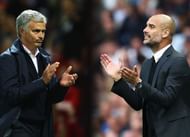“Consider the practical effects of the objects of your conception. Then, your conception of those effects is the whole of your conception of the object.”
Charles Sander Pierce penned these words in his Maxim of Pragmatism. In simpler words, Pragmatism means “an approach that evaluates theories or beliefs in terms of the success of their practical application” or “dealing with things sensibly and realistically in a way that is based on practical rather than theoretical considerations.”
Often termed as boring, uninspiring and “anti-football”, the pragmatic approach is often misunderstood. Pragmatism is nothing but the systematic and methodical approach of getting the best outcome considering almost all external factors such as a group of players at the manager's disposal, the opponent’s strength etc. It need not always be defensive. It is based on the simple idea that it doesn’t matter how you score goals, what matters is that you score goals.
The roots of pragmatism can be traced back to the early 20th century. The way that football was played by all teams was basically the same. Every team used to play with 2 defenders, 3 midfielders and 5 forwards - the famous 2-3-5 formation. It was also a time when people were more focused on the way they played rather than just what the end result was going to be. Even though the formation and tactics were raw, the emphasis on ‘beautiful football’ was never ignored.
Herbert Chapman was the first person to the ditch the 2-3-5 formation and introduce a ‘W-M’ formation with 2 of the inside forwards of the 5-man front line dropping deeper into the midfield with the main objective to counter the opponent’s attacking threat. This was a very successful system with Chapman getting success and results at both Huddersfield Town and Arsenal. He can be credited with the title of the first person to prioritize substance over style. He is quoted in Jonathan Wilson’s famous book 'Inverting the pyramid' - “They must score goals, no matter how, and points. The measure of their skill is in fact judged by their position in the league table.”

After Chapman, came the most notorious style of play, most commonly known as ‘The Catenaccio’. It began in Geneva with Servette, a semi-professional team who struggled against foreign professional teams. Their coach, Karl Rappan had the idea to put emphasis on defence and then hit the teams on the counter-attack. Rappan pulled 2 of his midfielders back into the defence to form a back four and the inside-forwards of the front 5 acted as deeper lying players, which helped to overload the midfield. The basic idea of this pragmatic system was to always have an extra man to defend. The story goes that Italian coach Guisepe Viani adapted the Catenaccio system after being inspired by seeing a fisherman use an extra net to catch the fish who escaped the main, bigger net. Italy is where this system really took off with Salernitana, Milan, and Internazionale.
As time progressed, the pragmatic approach in the game became more popular. It also reached a point where the headlines in the newspaper were describing it as ‘bad football’. When the more pragmatic Argentina played (and won) against the ‘Total Football’ Netherlands squad led by Johan Cruyff in the 1978 World cup final, it was widely remarked as a match-up of 'Good football vs Bad football'.
A little later into the 21st century, came a man whose reputation and the universally accepted concept of pragmatism go hand in hand – Jose Mourinho. Mourinho’s philosophy is closely based upon the words of Sander Pierce, but his reputation is that of a villain in a movie about football. It looks likely that his nickname, ‘an enemy of football’ was derived keeping in mind the analogy made previously. It also doesn’t help Jose’s case that he flourished in the same era competing against Pep Guardiola, whose teams play some of the most breathtaking brand of football. Guardiola, for obvious reasons, is the hero in the movie of football. Guardiola vs Mourinho is the modern interpretation of Argentina vs the Netherlands, the ‘Good football vs Bad football’.

An argument could be made that the way the aforementioned rivalry that has been built up has accounted to the growing misconceptions about pragmatic football. But what exactly does Pragmatism mean? Is it to stick your principles no matter what? Or does it mean to keep 11 men inside their own half to get a result?
Pragmatic football basically means, for a team, to understand and analyze an opponent’s weaknesses and their own weaknesses to try and develop a system which counters their own flaws and exploits the opponent’s weaknesses. If that’s true, according to the words of Charles Sander Pierce, then no manager can ever go without not being pragmatic. The wholesome idea is misread, misunderstood and defined in such a way that can sell newspapers. Pragmatism never meant anti-football or defensive football - the proof lies in the way it has evolved in football.
Rafa Benitez’s Valencia, Mourinho’s Inter, Zidane’s Madrid - there is no denying the fact that pragmatic approaches are successful. To win, no matter how, gets you success.

There is no denying that pragmatism need not be boring, unattractive or ‘anti-football’ but like everything else in life, it has its flaws. Pragmatism often sucks out creativity and the game would lack any romanticism if pragmatic football ruled over the footballing world.
You wouldn’t want every goal to be a well-constructed counter attack or two direct long passes leading to the goal being scored. On the other side, you also wouldn’t want every string of 25 passes converted into a goal. The secret lies, just like all other things, to find the right balance. The way football is right now, very few would like to see it change drastically.
Pragmatism has its own beauty. It is a mere matter of personal preferences on how you like to see and perceive football. One thing is for sure though, every ying needs a yang and in football, ‘beautiful football’ has always had its own yang which makes this game an extra bit special.
What is more important? To win, or to win with integrity and principles? A question tough to answer in both football and in life.
To win is always the objective, but how to win depends on perspectives.
Whatever may be the conceptions about it, pragmatism, along with other philosophies, has undoubtedly influenced the footballing world.
